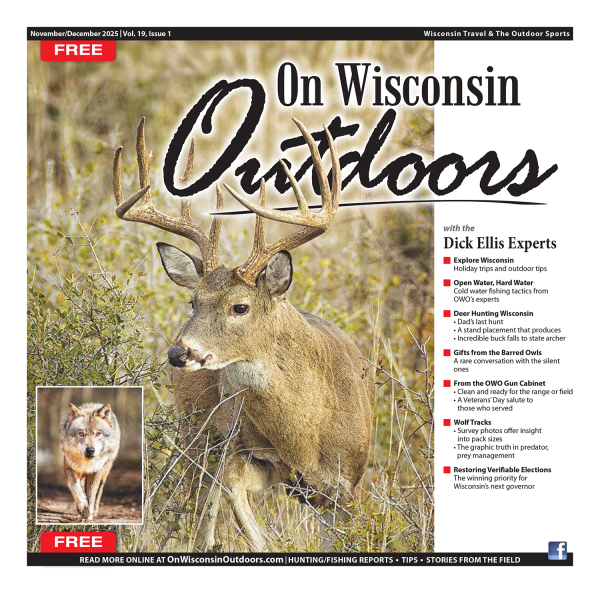DNR Weekly News Update for September 4, 2018
Published - September 4, 2018 by the Central Office
Youth Waterfowl and regular season Canada goose hunts set to open in September
Contact(s): Taylor Finger, DNR migratory game bird ecologist, 608-266-8841; Trenton Rohrer, DNR Assistant migratory game bird ecologist, 608-261-6458
MADISON -Regular season Canada goose hunting opens Sunday, Sept. 16, along with the Youth Waterfowl Hunt Sept. 15-16.
Youth Waterfowl Hunt
This year's Youth Waterfowl hunt will be held Sept. 15-16. This special hunt offers youth hunters ages 15 and under the opportunity to learn skills from an adult without the increased hunting pressure encountered during the regular season.

This year's youth waterfowl hunt will be held Sept. 16-17.Photo credit: DNR
"These two days provide a great opportunity for nearly 3,500 kids annually - many of which get out due to the generosity of a friend or family member," said Taylor Finger, Wisconsin Department of Natural Resources migratory game bird ecologist.
Normal season bag limits apply, but all license and stamp requirements are waived for the youth hunt. However, participants still need to be HIP registered (free of charge) and possess both an early and a regular season goose permit if they wish to hunt geese during both days. Licensed adults may also hunt geese since the early and Exterior seasons are open during these dates.
Individuals of all ages and skill levels are reminded to check out a Learn to Hunt waterfowl clinic in their area to learn more about hunting and its role within conservation.
Regular Goose season
With resident Canada goose breeding numbers similar to recent years and average production of the Ontario breeders, hunters should have ample opportunities this year, and will again enjoy a full 92 days of hunting in the Exterior zone with a 3-bird daily bag limit.
"When combined with the 15 days of the early season, this puts WI at 107 days of Canada goose hunting, and the maximum season length allowed by federal law," said Finger
Exterior Zone Canada goose season structure is as follows:
- Northern Zone - Sept. 16 to Dec. 16;
- Southern Zone - Sept. 16 to Oct. 7 and Oct. 13 to Dec. 2 and Dec. 16- Jan. 3, 2019; and
- Mississippi River Subzone - Sept.29- Oct 5 and Oct. 13 to Jan. 3, 2019.
Hunters should note that the goose season is closed during the duck season split in both the South Zone (closed Oct. 8-12) and Mississippi River Subzone (closed Oct. 6 -12). The southern zone for the first time will also have a second split when duck season ends (closed from Dec. 3-15) and opening back up and running through Jan 3, 2019.
As a reminder the Horicon Canada goose Zone was eliminated and is now a part of the Southern Exterior goose zone.
For more information regarding waterfowl hunting in Wisconsin, visit dnr.wi.gov and search keywords "waterfowl management."
Go Wild
Early and Exterior Zone goose permits are printed on regular white paper, rather than green thermal paper. While afield, hunters must carry their Canada goose harvest permit. Acceptable methods of proof include a paper copy, Go Wild generated PDF displayed on a mobile device, Wisconsin driver's license or Go Wild Conservation Card. As a reminder to Canada goose hunters, registration of Canada geese and in-field validation of the Canada goose hunting permit is no longer required. For more information regarding Go Wild, visit GoWild.Wi.gov [EXIT DNR].
Avian Influenza
Several federal agencies are working in cooperation with the Wisconsin Department of Natural Resources to collect samples related to the research and surveillance of avian influenza in wild birds. This surveillance will help monitor for the virus during fall migration. Wild birds from targeted areas throughout the state will be sampled between now and spring 2018.
Avian influenza is a viral disease common in wild bird populations with many different subtypes - most do not cause obvious signs of disease in wild birds or have the ability to infect animals other than birds. While strains currently detected in the U.S. have caused mortality of domestic birds, they have not resulted in any illness in humans.
Samples will be collected from live-captured birds during DNR banding efforts and from hunter-harvested dabbling ducks, such as blue-winged teal, mallard, wood duck and Northern pintail. Federal staff will also be located at boat landings and other hunter access points this fall to sample ducks from willing hunters.
To learn more, search keywords "bird diseases."
________________________
DNR Conservation Wardens reminder to ATV and UTV riders: "Wear it, Wisconsin!"
Contact(s): Gary Eddy, off-highway vehicle administrative warden, 608-219-2566
MADISON - With more crashes involving all-terrain and utility-terrain vehicles this late summer state conservation wardens are urging all operators and riders to remember safety steps. Wisconsin has seen 16 fatal crashes involving all-terrain and utility-terrain vehicles this year.

Gary EddyPhoto credit: DNR
Gary Eddy, off-highway administrative warden with the Wisconsin Department of Natural Resources, says wardens statewide are encouraging all operators and riders to "Wear it Wisconsin!"
"That means wearing helmets for ATVs and UTVs, and your seat belts on an UTV," Eddy said.
Anyone under the age of 18 must wear a helmet, and that helmet must meet U.S. Department of Transportation standards.
Eddy says a common factor in fatalities is the lack of wearing helmets and not wearing the UTV seatbelt.
Versatile vehicles best used with safety in mind
"These machines are popular for work and for play, and their use continues to grow in Wisconsin," Eddy said. "Since you can't predict when an incident will occur, it is best to protect yourself and your passengers for that possibility. Simply put on the helmet, fasten the safety straps and click the seatbelt."

One safety tip is to never ride ATVs or UTVs alone. If a mishap happens, you may need immediate help.Photo credit: DNR
"It is always important to remember safety while operating these vehicles for work or recreational purposes," Eddy said. "These machines are often operated on paved surfaces and across rough terrain. These conditions bring their own set of hazards. That's why the use of safety equipment is so important. Many of these tragedies may have been prevented had seat belts and helmets been used."
Eddy urges all ATV and UTV owners to spread the "Wear it Wisconsin" message by setting a personal rule that helmets and seat belts are always used on their machines. Also, educate others you know on the importance of using helmets and seat belts. "A little positive peer pressure on your family and friends can help," Eddy said. "We want everyone to stay safe and have fun while using these versatile vehicles. Here are more of Warden Eddy's safety tips for all ATV-UTV riders:
- Never drink and ride. ATVs and UTVs are challenging enough to operate sober; adding alcohol endangers everyone around you. Practice "Zero Alcohol" and wait until you're done operating all vehicles before consuming alcohol.
- "Seize the keys:" Control who and when your machine is being operated.
- Complete an ATV safety course. All ATV riders at least age 12 (and UTV operators at least age 16) and born after January 1, 1988 must complete a course prior to operating an ATV or UTV. This course may be completed either in a classroom or over the internet. Search the Wisconsin DNR website for ATV Safety" to learn more.
- Use extreme caution while operating on paved surfaces. ATVs and UTVs highly unstable on paved surfaces and cannot be operated in the same manner as a car. All maneuvers must be made in a slow, controlled manner. Corners cannot be taken at the same speed as other motor vehicles.
- Never ride alone. If a mishap happens, you may need immediate help.
- Slow down, be responsible and expect to meet other people while on trails.
- Stay on the right side of the trail. Rough terrain and puddles are part of the experience; don't endanger others by riding on the wrong side of the trail. Cross obstacles in a controlled and safe manner.
- Don't operate your machine outside the limits or capabilities of you, the machine or the environment (trail condition, terrain, hours of darkness, etc.)
- Headlights and tail lights are required at all times while on public roads. All turns must be indicated by use of turn signals or hand signals.
- ATV/UTV is among our state's favorite recreational activities in the summer months. Stay safe and stay responsible.






